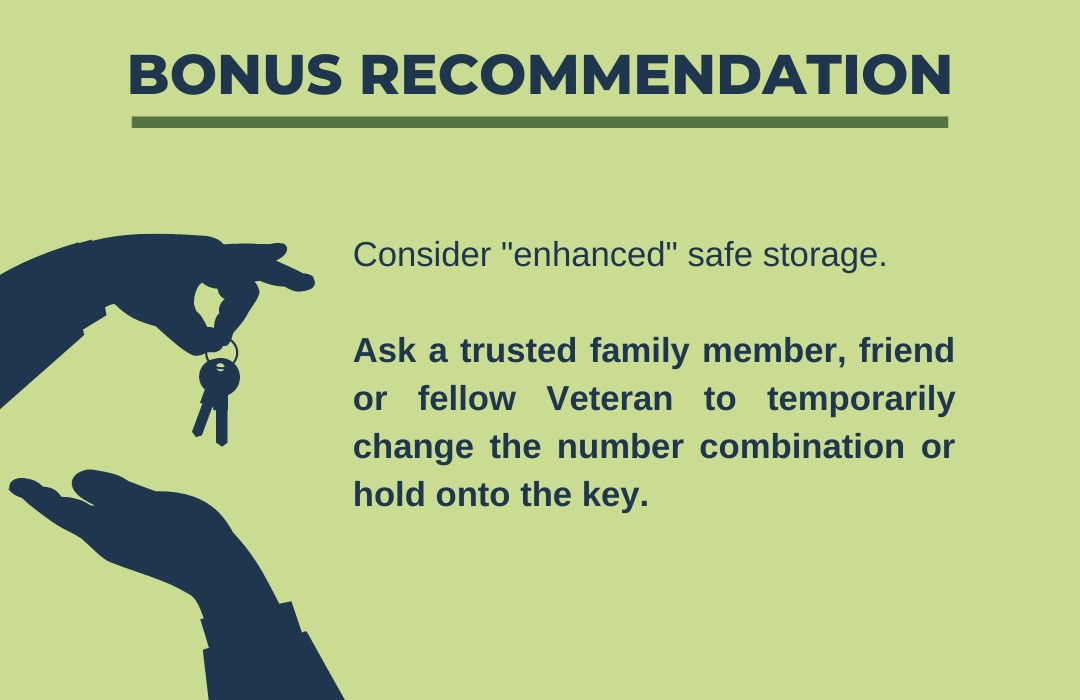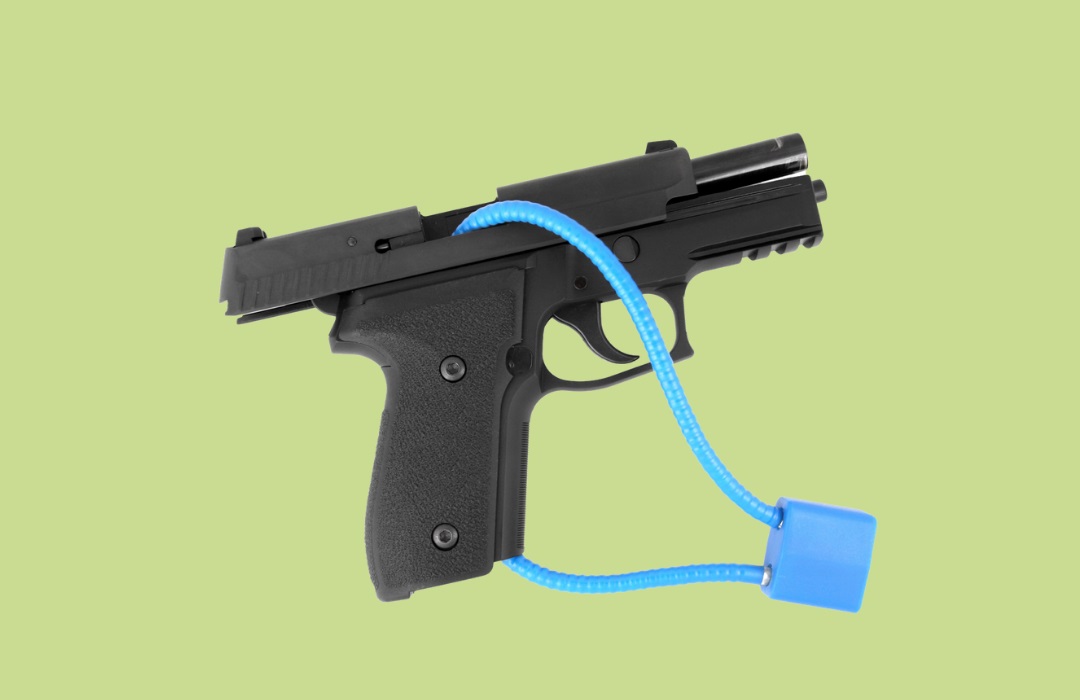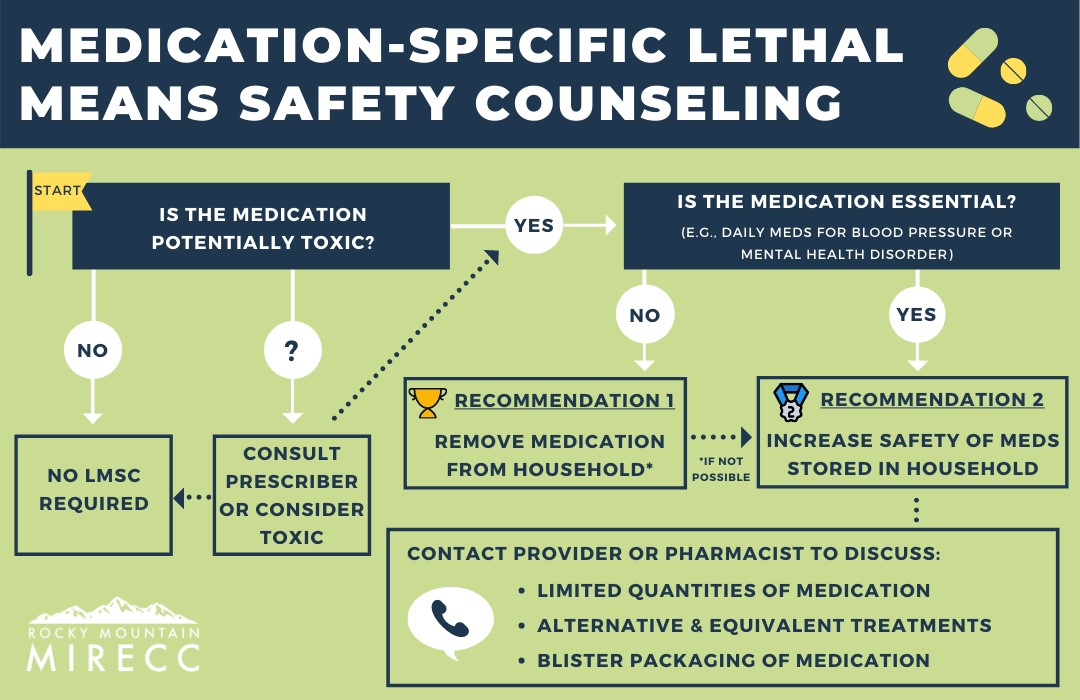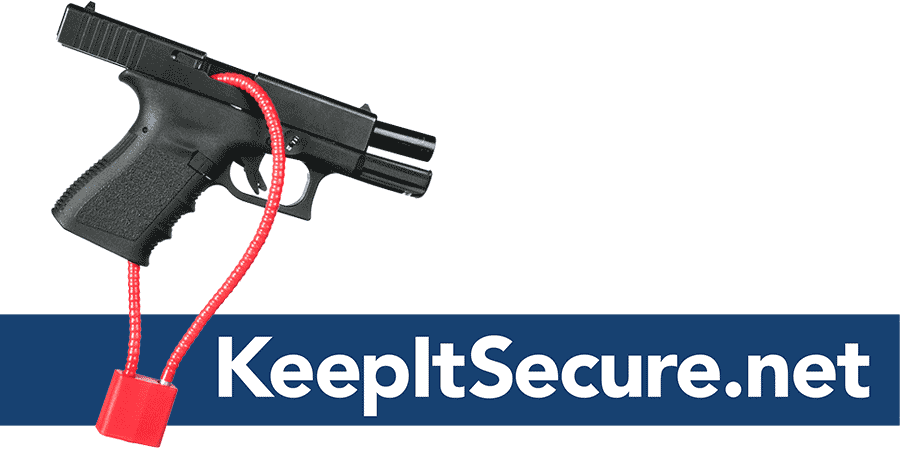Attention A T users. To access the menus on this page please perform the following steps.
1. Please switch auto forms mode to off.
2. Hit enter to expand a main menu option (Health, Benefits, etc).
3. To enter and activate the submenu links, hit the down arrow.
You will now be able to tab or arrow up or down through the submenu options to access/activate the submenu links.
Locator
Contact
Search
Lethal Means Safety Recommendations
 |
|||
 |
 |
 |
 |
What is an "evidence-based" Lethal Means Safety recommendation?
LMS recommendations are informed by studies analyzing suicide risk. Some research compares risk among those with and without household access to a specific suicide method, while other studies look at population-level changes.
Firearm-specific LMS
Putting time and space between a suicidal person and a gun may save a life.
| This Firearm Suicide Prevention Training Video (5 minutes) talks about a different side of firearm safety – suicide prevention. Lock, limit, and remove access when someone you love is at risk for suicide. |
| How? |
| • Have a trusted family member, friend, or fellow Veteran hold on to the firearm(s).* |
| • Rent a personal storage unit. |
| • Contact local resources to inquire about storage options: |
| - Shooting ranges, firearm clubs, or firearm retailers |
| - Law enforcement |
| - Pawn shops |
| • Sell or pawn the firearm. |
| • Remove ammunition from the household. |
| *When recommending that a Veteran transfer his or her firearm to another individual, it is important to remember two issues: |
| 1. Firearms should not be transferred to other individuals who themselves are at risk of suicide or unintentional injury, nor to individuals who reside in households with those at risk of injury. |
| 2. U.S. state and federal laws prohibit personal firearm transfers under some circumstances. Providers should not recommend transferring firearms to a specific person without a full understanding of firearm transfer laws. Link to reference |
| How? |
| • Lock firearms within the household. |
| - There are various options for locking up household firearms. Firearm owners may have strong preferences for how their firearms are stored. Link to reference |
 |
||
| Consider “enhanced” safe storage. Ask a trusted family member, friend, or fellow Veteran to temporarily change the number combination or hold on to the key. |
| • Store firearms unloaded. | ||
| • Lock up the ammunition. | ||
| • Disassemble the gun. Considering locking up or storing specific parts elsewhere (e.g., firing pin, slide). | ||
 |
||
| A handgun secured with a cable lock. | ||
| Special considerations in firearm-specific Lethal Means Safety Counseling (LMSC): | ||
| • For some Veterans, there is a sociocultural value to owning and using firearms. Recognizing the importance and value of firearms in some Veterans’ lives is a foundation for initiating these discussions. Link to reference | ||
| • Two-thirds of Veterans own firearms for personal or household protection. In many cases, effective LMSC may include a discussion about balancing the short-term risk of self-injury against the long-term risk of victimization from others. Link to reference | ||
| Learn about safe and secure firearm storage recommendations from a Veteran and competitive shooter in this video. | ||
| Watch this explainer video to learn about different ways to responsibly store firearms to support clinicians in having informed, individualized conversations with their patients and making appropriate harm reduction recommendations. | ||
Medication-specific LMS
When providing LMSC, keep in mind that medications vary in their toxicity. Use this tool to guide your LMSC decisions.
Medication-specific LMSC flow chart
 |
||
| View a text only version of the Medication-Specific Lethal Means Safety Counseling flow chart. NOTE: The Medication-Specific Lethal Means Safety Counseling flow chart is currently unavailable to download while we improve the accessibility. Thanks for your patience and we apologize for the inconvenience. |
| Special considerations in medication-specific LMSC: |
| • Access to the opioid medications (e.g., oxycodone, morphine) of family members is an important risk factor for suicide. When possible, household members should increase the safe storage of their own potentially lethal medications. Link to reference |
| • Opioids are a common cause of medication-related suicide and self-injury among U.S. Veterans. Naloxone (either nasal spray or auto-injector) is a reversal medication that is effective in preventing opioid overdose. Link to reference 1 | Link to reference 2 |
| • Consider providing naloxone to patients who use prescribed or unprescribed opioids and teach them and their family members how to use it in case of an overdose. VHA pharmacists can be very helpful in accessing this medication for patients. Trainings are available for opioid overdose education & Naloxone distribution. Link to reference |
Safe Storage from One Veteran to Another
For more information on practicing safe storage of firearms, medication and other lethal means, visit KeepItSecure.net

Ask questions or get help
Suicide Risk Management Consultation Program
 |
||
| Get free consultation, support and resources for treating Veterans at risk of suicide. Visit the SRM page. |
Last Updated 20 February 2025



















